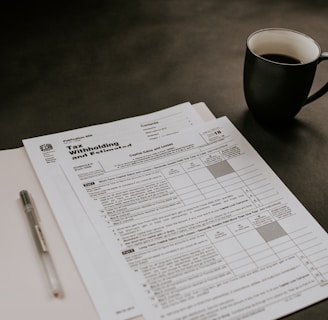Which Tax Form Do You Need? A Simple Guide to 1040, 1120S, and 1065
Confused about IRS Forms 1040, 1120S, or 1065? Learn which tax form fits your business or personal situation in this simple guide from Loyal Tax Services.


Introduction
Choosing the right tax form is critical for accurate IRS filing and avoiding penalties. Whether you're self-employed, a business owner, or part of a partnership, understanding the difference between Form 1040, 1120S, and 1065 can save you time, stress, and money. This guide breaks down the key differences and helps you determine which form applies to your situation.
IRS Form 1040 – For Individuals and Sole Proprietors
Form 1040 is the U.S. Individual Income Tax Return, used by individuals to report personal income, deductions, and credits. If you’re a freelancer, independent contractor, or sole proprietor, you’ll report your business income and expenses on Schedule C, which is filed along with Form 1040.
You should file Form 1040 if:
You earn personal or self-employment income.
You run a business as a sole proprietor.
You need to claim deductions like the standard deduction, education credits, or the earned income tax credit (EITC).
IRS Form 1120S – For S Corporations
Form 1120S is used by S Corporations to report income, deductions, and credits. S Corps don’t pay corporate income tax. Instead, income flows through to shareholders via Schedule K-1, and they report it on their personal returns.
You should file Form 1120S if:
Your business is elected as an S Corporation.
You want pass-through taxation to avoid double taxation.
You issue K-1s to shareholders based on ownership percentages.
Filing 1120S requires you to also manage payroll filings (Forms 941 and 940) and issue W-2s for employees and 1099s for contractors.
IRS Form 1065 – For Partnerships and Multi-Member LLCs
Form 1065 is the return of partnership income and is required for general partnerships and LLCs with more than one member. Like S Corps, partnerships don’t pay income tax directly. Profits and losses are reported on each partner’s Schedule K-1.
You should file Form 1065 if:
Your business is a partnership or a multi-member LLC.
You share profits, losses, and liabilities among two or more owners.
You need to provide each partner with a K-1 to file their individual taxes.
Still Unsure? Let Loyal Tax Services Help
Each business structure comes with unique tax obligations. Filing the wrong form can result in delays, penalties, or missed deductions. At Loyal Tax Services, we help individuals, LLCs, partnerships, and S Corporations file the right IRS forms on time and with full compliance.
Ready to file your taxes with confidence? Contact us today to schedule a free consultation.